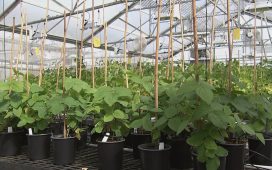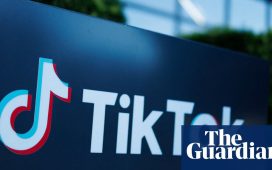MARTINSBURG, W.Va. (AP) – When Mary Ann Jividen moved to West Virginia, she fully expected that there would be services available for deaf people to utilize throughout the area. With only two hours separating her and Washington D.C., it felt like a foregone conclusion.
Shocked to find the Eastern Panhandle devoid of any such services, Jividen, who is deaf herself, took matters into her own hands.
“I was so surprised,” she said in a recent interview. “So, in 2017, I started to build everything through word of mouth.”
What she built was Eastern Panhandle Deaf Alliances, Inc., which “strives to provide the services to Deaf, Hard of Hearing, Deaf-Blind, and Late-Deafened to improve the quality of their lives,” according to the group’s Facebook page. In addition to that, the group provides case management, deaf advocacy, community education, interpreter advocacy, early family services and senior citizens services to those who need it.
It’s been four years since Jividen hatched her idea, and this year, the organization is part of the Unity Campaign, which is organized by the United Way of the Eastern Panhandle and aims to raise money for area nonprofits that service the community.
With the money raised this year, Jividen said she hopes to be able to pay for a proper website for the organization in order to help communicate with clients and spread the word of the service, among other things.
“We need to expand services,” she explained. “We only have a few programs like communication education, family services, information and referrals. We need to expand that, and we need to add additional information in the form of a website, as opposed to Facebook. So we need to be able to grow more, so we can reach a larger audience.”
Part of that growth includes working with Jefferson Community Ministries. It was there where Kasey Walsh began working as the department head for case management in February. Fairly new to the job, she received an elderly client who was deaf and brought into JCC in an emergency situation. Quick on her feet, Walsh contacted a friend who knows interpretation. That friend ultimately connected Walsh with Jividen.
From there, Jividen set up a way for Walsh to utilize video chat software on her computer, diffusing a potentially disastrous situation for not just Walsh, but also Jefferson County Ministries.
“Mary Ann was so helpful, because the first time I met the client, we had to write down things, because I had no way to communicate with her,” Walsh recalled. “I was talking to the interpreter on the phone, and Mary Ann would sign to the client what I was saying. The communication was so much better. We got her the help that she needed. She felt very grateful that we were able to do that – that both my agency and Mary Ann’s were able to work together to make her feel more comfortable.
“She had no idea their organization even existed,” Walsh continued. “It’s really important, because I’m sure she has felt very lonely not having people like her within the deaf community. It was really one of those good wins for the day. It was just a really joyful experience with Mary Ann. Without her, I don’t know that I would have been able to get the client the help that she needed.”
According to Jividen, a crucial element for the alliances’ ability to help those in need comes in the form of Wavello, a video call system where everyone from the deaf person, to the hearing person, to the interpreter, can be seen. The technology played a key role in the organization navigating its way through the COVID-19 pandemic, as Jividen noted that she hasn’t seen an increase in need throughout the deaf community over the last year.
“Thank God for technology,” she said. “Many people needed help way before the pandemic started. They were lost in the dark, trying to find help, and they reached out for a number of reasons. All the social things were put on hold, so it’s been very quiet, but we were fortunate to have the video phone for the deaf, so they can see one another and chat. And I believe that helps their mental health. … The video phone allows the deaf people to reach out to the hearing community.”
While the Shenandoah Community Health Foundation doesn’t offer services for the hearing impaired, it is in the process of developing a vision program for its patients. Tina Burns, director of resource development for the foundation, explained recently that being part of this year’s Unity Campaign will hopefully help the organization raise enough money to purchase the equipment needed for diabetic eye screening.
The idea for the program came as the foundation realized that about 10% of its patients in 2020 had diabetes, and as it goes, many of those patients don’t receive the recommended dilated eye exam, which is suggested to those who suffer from diabetes because of the loss of vision that the disease oftentimes causes.
The eye screening, Burns said, would be able to identify whether there is an issue with the eyes that needs to be followed up on, and the screening would be done under the foundation’s supervision. The images would then be transmitted to an off-site ophthalmologist and in return, the foundation would receive a report outlining if there’s evidence of vision issues that they need to be addressed.
To get the program up and running, Burns said she hopes to raise $10,000 for the equipment to do the screening. According to the CDC, 50% of diabetics don’t receive the vision screening they need, and the progression of vision loss as a diabetic ages can become significant if it goes untreated.
“A high percentage of our patients have diabetes,” Burns said. “Many just don’t go to have their vision checked. We serve a lot of patients who have limited income or are uninsured. Even the ones who have Affordable Care Act coverage, the co-pays can be pretty high. The ACA is a wonderful program, as long as you fall in the ‘sweet spot.’ For people who fall just over what we call the ’’sweet spot, they can have pretty high deductibles. And with this, in the long run, it’s going to cost more anyway, so we really need to do preventive work now.”
Roy Hess has been going to the foundation for diabetic treatment for more than 15 years. Seeing a doctor once a month for his diabetes, he initially thought he had a kidney issue before the nurses at Shenandoah discovered he had a diabetes level greater than 500. From there, he’s been going back for treatment ever since they tested his blood level to properly diagnose him.
“Especially when you’re a diabetic, your M.D. wants to know about your eyes,” Hess said. “I’ve had both of my eyes operated on, and the doctor tells me for my age, he’s blown away that every time he checks me, my eyes are as good as they are. They take really good care of me.
“Shenandoah didn’t just change my life, it saved my life,” he added. “I would recommend going there every day of my life. My diabetic nurse keeps me straight and going, because as a diabetic, things get old to you. Every night I put insulin in my body, it gets to be old, and you get tried of it. That’s why a lady like my R.N. keeps me straight and keeps me doing the things I need to be doing. She’s the best. She’s just a tremendous nurse and a teacher.”
When Lisa Marion adopted her daughter, Lily, from China at the age of 7, she knew Lily was deaf, but she also saw a “really cute little girl” to whom she kept coming back when Marion and her husband decided to adopt. Marion knew a little bit of sign language already, and after talking with a friend, she learned that the only thing Lily would need is a set of hearing aids to begin learning language.
Since then, Marion has befriended a lot of those involved with the Eastern Panhandle Deaf Alliances, Inc., and, according to her, they have been extremely helpful as she navigates raising a deaf child. Recently, Lily got to the point where she needed new hearing aids, and as it turns out, children’s hearing aids are not covered by health insurance. As a result, some of the people in the alliances helped Marion find a grant aimed at helping her get the money to purchase the $6,000 hearing aids.
“The people in that organization are friends of mine,” Marion said. “They’ve been very welcoming to me. They teach me and correct me when I make mistakes. It’s all in a more of an informal friendship type of way. They’ve just been a great help.”
Walsh, of the Jefferson County Ministries, agreed, noting that while the alliances keep growing, she would love to see more people know that their services are even available. Most of that, she said, comes in the wake of how swiftly Jividen helped her out last year.
“She responded so quickly,” Walsh said. “They were going to try to send an actual interpreter to our facility to help me with communication, but it was so last minute that no one was available. Nobody was in the area to drive over and do it, and she said, ‘You know what, I’ll do it.’
“That,” Walsh reflected, “that was really amazing.”
Donations can be made to these organizations and other Unity Campaign participants at www.uwayep.org/unitycampaign.








